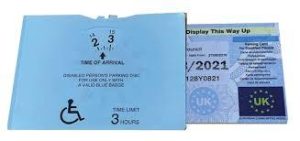A North London mum was left “distressed and frustrated” after the council refused her blue badge application she made to help her take her seriously ill son to his regular hospital appointments. A specialist nurse had co-signed a letter outlining the boy’s risk of infection and need for urgent transportation to hospital but the local authority claimed this was “not clinical evidence”.
The Local Government Ombudsman (LGO) found fault with the way Harrow Council considered the application because it “did not consider relevant criteria”. The Department for Transport’s (DfT) Blue Badge Scheme allows holders or their carers to park near their destination to access services and is administered by the local authority.

The mum, referred to in the LGO report as Mrs X, complained about the council’s failure to consider her application for her son, who was diagnosed with a serious illness in June, 2024. Mrs X applied for the blue badge because the young boy, referred to as Y, needed to attend hospital regularly – potentially in a life-threatening emergency.
Harrow Council refused her application because there was “no evidence of a need to carry bulky medical equipment or for treatment to be given in a vehicle”, according to the report. However, as the child was under three years of age at the time, they are eligible for a badge if they need to be taken to a place where treatment could be given.
The LGO found that “the correct criteria was not applied” and the need for urgent transport was “the main reason why Mrs X felt a badge was so important”. Mrs X appealed the decision and provided a letter co-signed by Y’s social worker and a clinical nurse specialist. She also provided information from the hospital regarding her son’s treatment.
However, her appeal was also unsuccessful as the council claimed the letter “could not be considered as clinical evidence” that Y’s treatment was described as “curative” and that his risk of infection “did not constitute a requirement to be near to a vehicle for urgent transportation”, according to the report.
The Ombudsman found fault with these reasons. The claim that Y did not have an enduring disability because his treatment was expected to be curative is not relevant as it only applies to someone who is at least three years old. The investigator also disagreed with the council’s claim that the letter co-signed by the nurse was “not clinical evidence”.
The report states: “The council’s assessment of the letter casts doubt on whether the council gave the nurse’s recommendations sufficient weight when making its decision. The letter clearly stated Y was at risk of life-threatening infection and if he showed signs of fever he needed to be taken to hospital immediately. However, the council appears to have disregarded this, by stating the risk of infection did not constitute a requirement to be near a vehicle.
“In my view this was in direct conflict with what was stated in the letter. While the council was the decision maker and it was still open to it to make the decision it did, my concern here is that the assessor gave insufficient weight to the content of the letter on the basis it did not constitute clinical evidence, when it clearly did.”
Since bringing her complaint to the Ombudsman, Y has been awarded a Blue Badge. This is because he now receives benefits that qualify him for one without further assessment. The Ombudsman has recommended that the council apologise in writing for the faults identified and pay Mrs X £150 for the “injustice caused”.

A spokesperson for Harrow Council said: “We accept the findings of the LGO and have apologised for the distress caused to Mrs X. While we work hard to ensure the expectations of our customers, unfortunately on this occasion we fell short of the standards that residents should expect to receive.
“We have since reviewed our processes and training for staff to ensure this doesn’t happen again. We will continue working to improve the customer experience of our residents through training programmes, meetings with staff, call and quality monitoring.”




